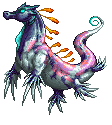Viewing Q29Po

Father: Unknown
Unknown Pedigree
Hardiness: 9
Appearance: 2
Emerged: 20:59 18.09.2020
Matured: 17:50 20.09.2020
A prevalent and diverse species of fish, Limaka Cevalos are found throughout the tropical and temperate oceans. Though their main source of food is phytoplankton or seaweed, these opportunistic grazers will consume any vegetation they can find, making them an ecological hazard if their population grows unchecked. During mating season, males will court females with offerings of food, grooming, and spending time with them. Pairs mate for life, and malescarry the eggs in a pouch on their ventral side until the juveniles emerge. Both parents care for the young until they are old enough to survive on their own.
Taking advantage of the bright and varied colorations of coral reefs, Gardeners dwell in shallow tropical waters. Their prehensile tails allow them to manipulate the world around them, and they can often be found building and maintaining their dens. Sociable by nature, it is not uncommon for Gardeners to bestow gifts upon not only their mates but also their neighbors. These offerings can range from smooth pebbles and bits of coral to food. Bonds forged by the exchange of gifts often encourage neighboring Gardeners to look out for one another as well as watch over each other’s dens.
The creatures that dwell in this rather desolate world still display some diversity in appearance, eating habits, and social behavior. Whether they have fur or feathers, skin or scales, their unique genetic makeup allows for a variety of colors and markings within each species. Despite limitations in food sources, herbivores, omnivores, and carnivores are all present in the food chain, and each species requires specialized care within a laboratory. Although the artificial setting of housing units and breeding pods precludes most opportunities to study true interspecific behavior, the interactions within and between species has been studied extensively in the wilderness by scientists daring enough to venture beyond the outpost’s walls.
